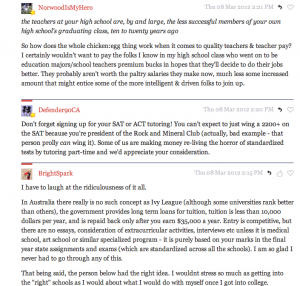Chapter 10: “Journalism Next” by Mark Briggs
March 8, 2012
News as a conversation is really the only way I know news. I always write about how I get most of my news online or through applications on my phone. There is almost always a place to leave a comment and start a discussion. This has it’s pros and cons. While there are many benefits to news as a conversation, Briggs writes three important ones:
- Provide transparency on the reporting process
- Enable an immediate feedback loop
- Spread awareness of news coverage through word-of-mouth marketing
Technology is constantly changing and so the way people get their news changes with it. That means if news consumers are getting their news in a different way, journalists must adapt, whether they want to or not, and provide their content in different ways on multiple platforms. Allowing readers to engage in a discussion and be proactive is key for a journalist. I think more people will be interested in reading something if they can comment on it.
Gawker has a pretty good commenting system going even though I wasn’t a fan when it first came out and they’re pretty good about keeping up with it. (I was de-starred on Deadspin because I promoted a comment that apparently didn’t contribute to the conversation, still bitter about that.) They use a tier and star system that’s served them well in my opinion but they have to do a lot of moderating.
Some of the cons I think with allowing people to discuss an article/video/photo on the Internet is dealing with the people who do nothing but try to stir the pot to just get attention, probably someone in their parents’ basement. Unfortunately, many people engage with these “trolls” but it shouldn’t take away from having an engaging, online discussion.
Briggs writes an entire section on setting guidelines for participants and what a world it would be if people actually abided by these guidelines. Journalists have a higher standard when they participate in conversations than those who do not. “I don’t see how social media is any different, as far as ethics are concerned. If a newspaper or TV station already has an ethics policy, it should apply to social media, too,” Briggs wrote. He brings up a good point but under the guise of a username, people don’t always write with ethics in mind, knowing there is no punishment. You can ban a user I guess, but unless you’re willing to ban someone’s IP address, they usually always come back.
One of my favorite places to get news is Reddit. Reddit is a social forum where people submit links, either something they’ve written or most likely a link for a great article. The comments are usually the best part of this–usually the best, most insightful comments are voted to the top and many of them are usually from different sides. I think I learn a lot just from reading their comments. They provide links, photos and whatever else they need to back up their comments so you know what to trust.
News as a conversation can be really beneficial but you have to be careful, the same way you have to be careful where you get your news from. I have learned so much from people I don’t know by the information they have written and/or linked to in online discussions and people shouldn’t distrust it just because they’re unsure. Everyone can be a journalist!
